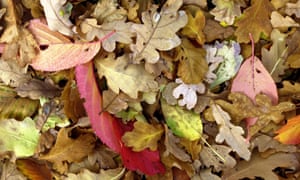Poem of the week: Autumn Rain by DH Lawrence
Intensely alive to the details of the natural world, Lawrence here combines the energy of his free verse with formal invention
 Fallen leaves in autumn. Photograph: Tim Ockenden/PA
Fallen leaves in autumn. Photograph: Tim Ockenden/PACarol Rumens
Monday 22 February 2016 11.00 GMT
Autumn Rain
The plane leaves
fall black and wet
on the lawn;
the cloud sheaves
in heaven’s fields set
droop and are drawn
in falling seeds of rain;
the seed of heaven
on my face
falling — I hear again
like echoes even
that softly pace
heaven’s muffled floor,
the winds that tread
out all the grain

Sign up to our Bookmarks newsletter
Read more
of tears, the store
harvested
in the sheaves of pain
caught up aloft:
the sheaves of dead
men that are slain
now winnowed soft
on the floor of heaven;
manna invisible
of all the pain
here to us given;
finely divisible
falling as rain.
Advertisement
Autumn Rain was first published in the Egoist, under the editorship of Dora Marsden and Harriet Shaw Weaver, in February 1917. Lawrence included it in the section headed Unrhyming Poems in his Collected volume, a minor point of interest, as his two categories Rhyming and Unrhyming aren’t stringently enforced. The positioning, though, helps the reader see what is gained and what is lost in Lawrence’s revisionist poetics, as he moves from a tightly lyrical, and arguably symbolist, mode of expression to predominantly free verse andWhitmanesque spontaneity.
His free verse poems vary in achievement: at their best, they capture the physical world with an unsurpassed intensity and vigour. Yet I can’t imagine anyone thinking Autumn Rain would be a more effective poem had Lawrence sacrificed his ingenious rhyme-scheme and adopted a more rhetorical or oratorical tone. The vices of copybook traditionalism are quietly transformed: for instance, the inversion in “echoes even” sounds out the trochaic regularity of repeated footsteps. The further possibility of a double meaning for “even” turns the whole device into a masterstroke.
Christian “resurrection theology” appears to inform the harvest symbolism but is under-lit by visions of less supernatural phenomena. The sky, “heaven’s muffled floor”, is the threshing floor where “winds” winnow the harvest of the dead. Despite the “manna” reference, there’s no mention of God, and “heaven” remains uncapitalised. We’re left with an impression of natural recycling rather than divine intervention, even if the descriptive tone is more consolatory than might be considered realistic.
The rhyme scheme makes itself felt in the second stanza. It’s a simple scheme at first. Stanzas one and two rhyme abc, abc, and that pattern, using a new set of rhymes, continues until stanza seven, where the middle line reproduces, in “dead,” the rhyme heard twice before (“tread”, “harvested”). In stanza eight, a new rhyme occurs at the end of its third line (“invisible”). Here, by the way, there’s another apparent adjective-noun inversion, “manna invisible”. It’s an illusion, of course: Lawrence, somewhat awkwardly, but not ineffectively, continues the sentence: “manna invisible // of all the pain …” so readers must re-think the grammatical position of “invisible”. The final quatrain recalls a rhyme first occurring in the “rain” of stanza three, picks up a near-rhyme with “heaven” and “even” in the form of “given”, and partners “invisible” from the previous stanza with “divisible”. There’s a lot more going on in terms of sonic effect, of course, than the “sound” of rhyme: “fall”, “drawn”, “falling”; “sheaves”, “fields”, “seeds” etc. Such assonance is subtly mimetic, never merely decorative. The “aw” of the long “a”, for instance, contrasts with the harshness of sound in “pain” and “slain”, enabling us to hear the imagined transformation of suffering occasioned by the soft, encapsulating autumn rainfall.
Should it be read as a war poem? There might be a connection with the short poem Bombardment, in whose four tercets something more dreadful and dramatic than rain descends from the sky. References to “sheaves of pain” and “sheaves of the dead / men that are slain” and a slight similarity of form may be clues. The final quatrain of Autumn Rain, however, suggests a more inclusive reach, envisioning redemption by metamorphosis for “all the pain / here to us given …”A
沒有留言:
張貼留言